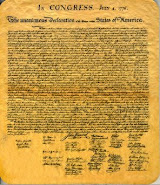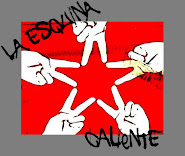 A couple of articles in response to Obama's http://www.change.gov/ transitional website and the prospects of internet technologies broadening participatory democracy under an Obama administration. - Editor
A couple of articles in response to Obama's http://www.change.gov/ transitional website and the prospects of internet technologies broadening participatory democracy under an Obama administration. - Editor
Under Obama, a newly interactive government?
The president-elect aims to use the Internet to make government more participatory.
By Alexandra Marks Staff writer / November 13, 2008 edition
New York
Source: http://features.csmonitor.com/politics/2008/11/13/under-obama-a-newly-interactive-government/
Want to give Barack Obama a piece of your mind about what’s wrong with the United States government? Just go to www.change.gov and click on “Share Your Ideas.”
A man named John from Seattle did: “I am so tired of special interests getting the best of us all.”
So did Lexington from San Diego: “I’d like to see an agenda that focuses on promoting transparency….”
The website is the official, online face of the Office of the President Elect. It gives a first glimpse of how Mr. Obama intends to harness technology to create a cutting-edge, participatory democracy in a similar way he used Internet connectivity to transform campaigning.
The idea is premised on the digital world’s potential to transform the US into one large cyber town-hall meeting: Every citizen will ideally have a window into the workings of government and an opportunity to tell elected leaders exactly what they think of it.
It’s an idealistic notion that will require some concrete changes – from a large investment in upgrading government computers to a change in the rules and regulations that guide government employees. Most important, it will require a radical transformation of the entrenched culture of secrecy and the dominance of special interests that define how Washington operates.
“This will be the first president who has an opportunity to use interactive technology in ways we’ve never seen – it really is remarkable,” says Gary Bass, executive director of OMB Watch, a nonprofit organization that promotes greater government accountability and transparency in Washington. “What was so unique about the Obama campaign [was] that interactivity was real. When people commented on something, they saw things happen. That’s what the people are expecting the president to do now.”
Obama will not be the first online president. That was Bill Clinton, who set up the White House’s first website in 1994 and in 1996 ordered all federal agencies to get online as well. The websites were pretty rudimentary sources of information. President Bush took that a step further, turning the White House website into a “repository of all the things the president was doing on that day,” according to David Almacy, who was the White House’s Internet director from 2005 to 2007.
But as Mr. Almacy discovered, much of what the White House could do was constrained by a lack of resources. He had a staff of six to run the White House’s Internet operations. The Obama campaign had 95 people. Then there are the federal rules and regulations.
For instance, when Mr. Bush went to New Orleans in the aftermath of hurricane Katrina, he urged Americans to log on to RedCross.org. Almacy decided to put up a link on the White House website. Within hours, the White House counsel’s office was directing him to take the link down because it might be perceived as endorsing one organization over another, says Almacy.
There are privacy questions, too. Many websites use “cookies,” electronic calling cards that websites leave on your computer to identify you if you return. Federal privacy policy discourages their use, saying there should be a “presumption” that they’re not used on federal websites.
But there is a loophole. Cookies can be used if an agency can demonstrate a compelling need and gets special permission. The Obama transition team is taking advantage of that. Change.gov uses cookies and states that in its privacy policy.
“Obama will probably run into some more rules that are going to need amending,” says Robert Bluey, director of the Center for Media and Public Policy at the Heritage Foundation. “But I think it’s absolutely great that people will have more opportunity to have a say in government and it’s pretty evident from change.gov that’s the direction that Obama’s going to take.”
Obama has set out a clear road map as to how he hopes to accomplish that. It starts with the appointment of a chief technology officer with cabinet-level powers who will oversee technological operations across the government.
“Most people from the 20th century think of technology as a separate issue from others like healthcare or energy, but it’s not just one of many issues [like one of many slices of a pie], it’s the pan that supports innovation and change for all of the other issues,” says Andrew Rasiej, copresident of techpresident.com. “It’s essential that the Obama administration put someone in a position who understands that.”
Federal employees will also have to change how they operate, setting up pilots in citizen participation, which means “Wikis [websites where visitors can change the content], comment sections, collaborative projects, public review of pending policies, and online dialogues,” says Mr. Bass.
That may not sit well with some longtime federal employees. “It’s a radical change,” says Ari Schwartz, vice president of the Center for Democracy and Technology. “But it’s in line with the way our government is supposed to work.”
Then there’s the larger question of whether a citizenry that’s disillusioned with government is ready to get more involved. The optimists here abound.
“What’s been proven through this election process is that there’s a newly engaged and empowered citizenry that is ready, able, and willing to partner with the Obama administration on rebooting American democracy in a 21st-century model of participation,” says Mr.Rasiej.
__________________________________________________________________________________
 The Obama Team's Online Transition
The Obama Team's Online TransitionCBS Tech Analyst Larry Magid Looks At How A Web 2.0 Campaign Is Going Presidential
SILICON VALLEY, Calif. Nov. 14, 2008
Source: http://www.cbsnews.com/stories/2008/11/14/scitech/pcanswer/main4602335.shtml
(CBS) When it comes to the use of technology, President Obama will have a hard act to follow - candidate Obama.
As has been widely pointed out, the Obama campaign was masterful in the way it used the Web, social networking sites, text messaging and other technology to assure its victory on Nov. 4. In addition to raising consciousness and money online, the campaign even used text messaging to remind people to go to the polls.
The Obama Web site made it very easy for people to donate money, find local events and - as did John McCain’s site - give supporters online access to a phone bank of voters to help spread the word and get out the vote.
But now that we’re in a transitional period, the question is how the incoming administration will continue to use technology to further the president’s agenda. A sitting president isn’t in the same position as a presidential candidate. For example, it’s not at all clear to me whether he can legally use his campaign e-mail or text messaging lists to promote his presidential agenda.
But we do have a clue as to one way he might use technology. The “Office of the President-Elect” has a new Web site called simply change.gov, which appears to be almost an extension of Obama’s presidential campaign.
It shows news stories, including an embedded MSNBC video of transition team Co-chair Valerie Jarret’s appearance on “Meet the Press” last Sunday. There is also a link to Obama’s radio address from last Saturday and, of course, a video of Obama’s victory speech from election night.
There's also a bit of meat on this site, including information about the president’s Cabinet and - perhaps of great interest to some - information about how to apply for a job at the White House and other federal agencies, including an “online expression of interest form” for job seekers to put their toe in the water.
But, if you’re inclined to express an interest, the site warns that "if and when you are considered for a specific position, you will be asked to fill out additional forms, including financial disclosures, and be subject to other reviews which may include FBI background checks."
As the New York Times has reported, candidates for high ranking jobs and cabinet positions will also be asked to provide detailed information about their backgrounds, including their online personas; any emails or blog posts that might embarrass the President-elect, and any profiles on Facebook or other social networks and "aliases" or "handles" used to communicate over the Internet.
I wonder if they will scrutinize your list of MySpace or Facebook friends to see who you've been "palling around" with online.
Change.gov also includes a “blog,” but aside from the fact that it’s organized in reverse chronological order, it’s not all that bloggish. It’s mostly well polished short articles and a couple of videos but, unlike many blogs, there are no links for user comments.
There is a link where you can “share your story” about “what this campaign and this election means to you.” I’m not sure if they’re deliberately still calling it a campaign as if to say that there are still struggles ahead or if they just cloned this from the old campaign Web site and forgot to update the language.
Speaking of updating, CNET’s Delcan McCullagh wrote here on CBSNews.com that the site initially had detailed agendas for Homeland Security and technology that were deleted over the weekend, to be replaced by “a vague statement saying that Obama and running mate Joe Biden have a ‘comprehensive and detailed agenda’” that will “‘bring about the kind of change America needs.’”
The deletion of that agenda could very well be the beginning of recognition that Obama is no longer in the mode of making campaign promises but on the verge of having to deliver actual policy.
That’s a natural transition that all presidents-elect have had to deal with, but in the past they weren’t quite as exposed to online scrutiny as is this incoming administration.
Although it’s not exactly what I’m looking for, I am pleased to see that change.gov also has a place where visitors can share their "vision for what America can be, where President-elect Obama should lead this country. Where should we start together?” It falls way short of what I’d like to see in terms of participatory democracy, but it is a start.
The incoming administration can start by using the Internet to fulfill its promise to make government more transparent, by using the Internet to share information on legislation and policy discussions. But to do so effectively, it must be in a way we can all understand and with a mechanism for people to have their voices heard.
To be understandable, information can't just be in government-speak. The Library of Congress's THOMAS Web site has long made it possible for citizens to see the text of proposed legislation but I take my hat off to any layperson who can actually understand the text of a congressional bill. What's needed is for non-partisan interpreters to objectively explain these bills in language that we can all understand.
We also need a transparent feedback mechanism where citizens have the option of sharing their opinions, not only with the administration, but with fellow citizens through blogs and forums. I would like to see the President (or at least his surrogates) actively participate in an open online discussion. Admittedly, that could get so lengthy as to be become unwieldy but if these discussions do blossom, I'm sure news media and bloggers who follow these discussions will bring interesting nuggets to light.
Change.gov is clearly a work in progress which is certainly understandable considering how little time has passed since the election. My hope is that the administration will extend this effort into something that truly does involve citizens in government. We can all use a little more sunshine.
By Larry Magid






No comments:
Post a Comment